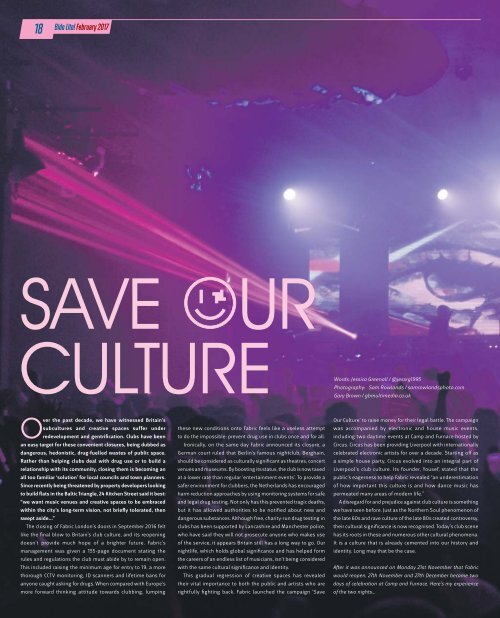Issue 74 / February 2017
February 2017 issue of Bido Lito! Featuring THE ORIELLES, OYA PAYA, NIK COLK VOID, DANNY BOYLE, THE LEMON TWIGS and much more.
February 2017 issue of Bido Lito! Featuring THE ORIELLES, OYA PAYA, NIK COLK VOID, DANNY BOYLE, THE LEMON TWIGS and much more.
Create successful ePaper yourself
Turn your PDF publications into a flip-book with our unique Google optimized e-Paper software.
18<br />
Bido Lito! <strong>February</strong> <strong>2017</strong><br />
SAVE UR<br />
CULTURE<br />
Words: Jessica Greenall / @jessrg1995<br />
Photography: Sam Rowlands / samrowlandsphoto.com<br />
Gary Brown / gbmultimedia.co.uk<br />
Over the past decade, we have witnessed Britain’s<br />
subcultures and creative spaces suffer under<br />
redevelopment and gentrification. Clubs have been<br />
an easy target for these convenient closures, being dubbed as<br />
dangerous, hedonistic, drug-fuelled wastes of public space.<br />
Rather than helping clubs deal with drug use or to build a<br />
relationship with its community, closing them is becoming an<br />
all too familiar ‘solution’ for local councils and town planners.<br />
Since recently being threatened by property developers looking<br />
to build flats in the Baltic Triangle, 24 Kitchen Street said it best:<br />
“we want music venues and creative spaces to be embraced<br />
within the city’s long-term vision, not briefly tolerated, then<br />
swept aside...”<br />
The closing of Fabric London’s doors in September 2016 felt<br />
like the final blow to Britain’s club culture, and its reopening<br />
doesn’t provide much hope of a brighter future. Fabric’s<br />
management was given a 155-page document stating the<br />
rules and regulations the club must abide by to remain open.<br />
This included raising the minimum age for entry to 19, a more<br />
thorough CCTV monitoring, ID scanners and lifetime bans for<br />
anyone caught asking for drugs. When compared with Europe’s<br />
more forward thinking attitude towards clubbing, lumping<br />
these new conditions onto Fabric feels like a useless attempt<br />
to do the impossible: prevent drug use in clubs once and for all.<br />
Ironically, on the same day Fabric announced its closure, a<br />
German court ruled that Berlin’s famous nightclub, Berghain,<br />
should be considered as culturally significant as theatres, concert<br />
venues and museums. By boosting its status, the club is now taxed<br />
at a lower rate than regular ‘entertainment events’. To provide a<br />
safer environment for clubbers, the Netherlands has encouraged<br />
harm reduction approaches by using monitoring systems for safe<br />
and legal drug testing. Not only has this prevented tragic deaths,<br />
but it has allowed authorities to be notified about new and<br />
dangerous substances. Although free, charity-run drug testing in<br />
clubs has been supported by Lancashire and Manchester police,<br />
who have said they will not prosecute anyone who makes use<br />
of the service, it appears Britain still has a long way to go. Our<br />
nightlife, which holds global significance and has helped form<br />
the careers of an endless list of musicians, isn’t being considered<br />
with the same cultural significance and identity.<br />
This gradual regression of creative spaces has revealed<br />
their vital importance to both the public and artists who are<br />
rightfully fighting back. Fabric launched the campaign ‘Save<br />
Our Culture’ to raise money for their legal battle. The campaign<br />
was accompanied by electronic and house music events,<br />
including two daytime events at Camp and Furnace hosted by<br />
Circus. Circus has been providing Liverpool with internationally<br />
celebrated electronic artists for over a decade. Starting off as<br />
a simple house party, Circus evolved into an integral part of<br />
Liverpool’s club culture. Its founder, Yousef, stated that the<br />
public’s eagerness to help Fabric revealed “an underestimation<br />
of how important this culture is and how dance music has<br />
permeated many areas of modern life.”<br />
A disregard for and prejudice against club culture is something<br />
we have seen before. Just as the Northern Soul phenomenon of<br />
the late 60s and rave culture of the late 80s created controversy,<br />
their cultural significance is now recognised. Today’s club scene<br />
has its roots in these and numerous other cultural phenomena.<br />
It is a culture that is already cemented into our history and<br />
identity. Long may that be the case.<br />
After it was announced on Monday 21st November that Fabric<br />
would reopen, 27th November and 27th December became two<br />
days of celebration at Camp and Furnace. Here’s my experience<br />
of the two nights…


















